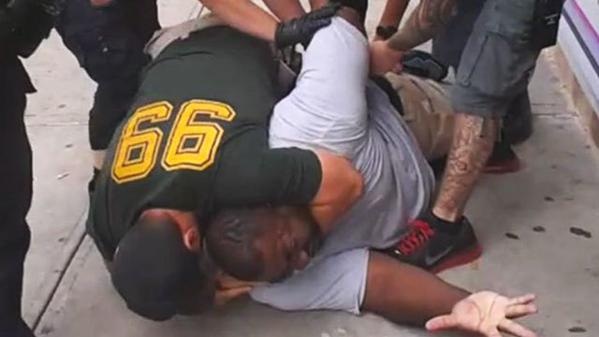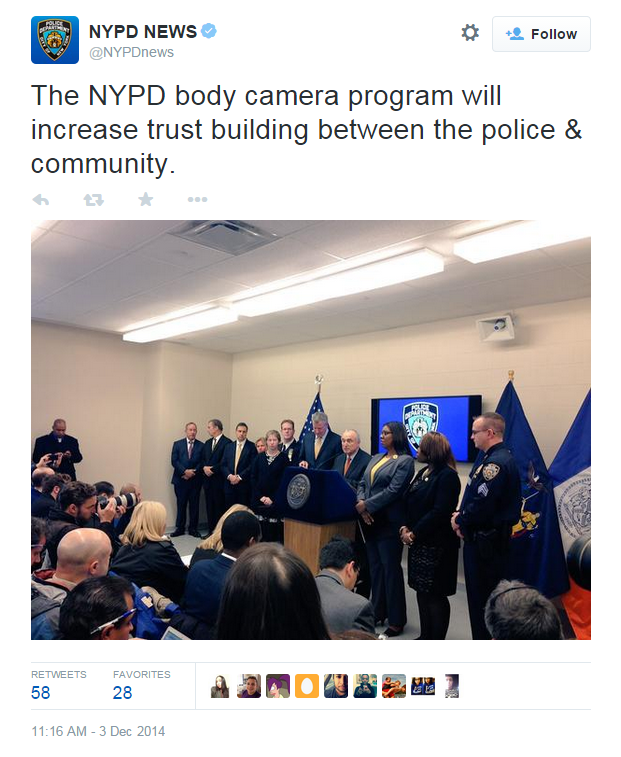|
Op-Ed: Even video evidence of a chokehold used by police won't protect certain citizens. On Wednesday, a Staten Island grand jury cleared a New York Police Department officer of all criminal wrongdoing in an incident that took place over the summer, when officer Daniel Pantaleo put Eric Garner, a 43-year-old black man who was a father of six, in a chokehold that killed him. Garner, an asthmatic, repeatedly told the officer that he couldn't breathe as he was being choked. The kicker is that the entire incident was caught on video by a bystander's phone. The video is clear, shows the whole incident, and was taken close enough to Garner and Pantaleo to pick up audio of Garner's pleas. Police say Garner was stopped for selling untaxed cigarettes. In the video of the incident between Garner and Pantaleo, the officer put him in a chokehold, which is prohibited by NYPD policy. Police unions have denied that Pantaleo used a chokehold. But the Medical Examiner's Office that reviewed Garner's body after he died ruled that he died of “compression of neck (chokehold), compression of chest and prone positioning during physical restraint by police.” New York City blog Gothamist wrote, "While most legal experts believed that the grand jury did not have enough evidence to prove a murder charge, the grand jury could have charged Pantaleo with manslaughter or criminally negligent homicide." "At a minimum, it was negligent, it was reckless, it was some level of homicide," Randolph McLaughlin, a law professor at Pace Law School and civil rights attorney, told Gothamist. "Surely they could have indicted this officer on any number of charges and let the public hear, let a trial happen, expose to the light of day what went on here." It is unclear what reasoning the grand jury used to come to its decision, nor is it known what questions the prosecution asked. But the decision not to indict a white cop who killed an unarmed black man loudly echoes the Michael Brown case in Ferguson, Missouri, where a white cop who shot an unarmed black teen over the summer was also cleared by a grand jury just two weeks ago. The circumstances of Brown's death, however, were somewhat murky given the lack of any clear video or audio recording of the incident and several conflicting testimonies from eye-witnesses. In the aftermath of the explosive and high-profile case, many suggested making body cameras mandatory for police officers on duty, citing trial programs in a few districts where use of body cameras was strongly correlated to the decline in the number of use-of-force incidents from police and a decline in the number of complaints from citizens. Two companies even donated 50 body cameras to Ferguson police. And earlier this week, the White House released a review of local law enforcement equipment, recommending that $75 million be set aside to buy up to 50,000 body cameras for police officers around the country. Privacy activists have tried to temper the growing enthusiasm for body cameras as a panacea against excessive use of force by police. They've cautioned that body cameras are only useful if there are clear rules about when footage is taken and what happens to the footage after an incident. Garner's case shows that, clear rules about taking and handling footage aside, a video that clearly implicates a white police officer in a black man's death cannot overcome what looks incredibly like—if not out-and-out racism—a dogged determination to uphold the impunity of police officers on the part of the justice system. Ultimately, it seems, video footage objectively showing how an incident occurred can be ignored. A chokehold, forbidden by the NYPD, can be justified. "Body cameras" need to be more than a buzzword that's gleefully inserted into police department press releases and then passed around for media to regurgitate. While body cameras should be encouraged, as they could absolutely clarify what happens during an altercation, the footage they produce has to be respected by the judicial system. Body cameras are part of an answer to stopping unnecessary deaths at the hands of police, but they are not the only answer. (For example, police departments looking to reduce their use-of-force incidents might look to Richmond, California, which has made headlines in the last year for not having killed a citizen of the largely violent city since 2008. The chief of police there was quoted as saying that he encourages his officers to regularly study and second-guess use of force incidents that occur in other parts of the nation). Ultimately, trust can't be bought simply by pouring money into the pockets of body cam providers like Taser. In a statement, the New York Civil Liberties Union (NYCLU) wrote, “The failure of the Staten Island Grand Jury to file an indictment in the killing of Eric Garner leaves New Yorkers with an inescapable question: How will the NYPD hold the officers involved accountable for his death? And what will Commissioner Bratton do to ensure that this is the last tragedy of its kind? Unless the Police Department aggressively deals with its culture of impunity and trains officers that they must simultaneously protect both safety and individual rights, officers will continue to believe that they can act without consequence.” A grand jury's task is not to decide the guilt or innocence of the accused but to decide whether there's enough evidence to send the case to trial. The New York Times explains the process: “Grand juries determine whether enough evidence exists for a case to go forward to a criminal trial, either before a jury or a judge. By law, they operate in secret and hear only evidence presented by prosecutors, who also instruct the grand jurors on the law. Defense lawyers are barred from speaking. For a decision, 12 jurors who have heard all the evidence must agree.” In Eric Garner's case, legal experts have said that the District Attorney involved, Dan Donovan, likely had little impetus to indict Pantaleo. "It’s politically costly for Dan Donovan to indict a police officer on Staten Island," Jeffrey Fagan, a criminal law professor at Columbia told Gothamist. "He can easily shift the political and legal burden to the Department of Justice to decide whether to pursue criminal charges. He’s washed his hands of it." The New York Post reported that Garner's family plans to sue the city for “wrongful death, pre-death pain and suffering, and civil-rights violations.” Update: The US Department of Justice also told NBC on Wednesday evening that it would be opening a federal probe into the death of Eric Garner. by Megan Geuss http://arstechnica.com/tech-policy/2014/12/video-of-police-brutality-can-only-do-so-much-nypd-chokehold-cop-not-indicted/ Comments are closed.
|
Archives
March 2021
|


 RSS Feed
RSS Feed